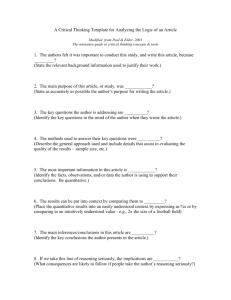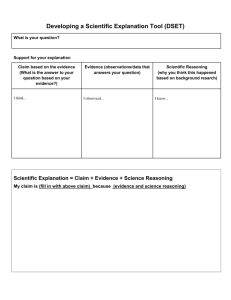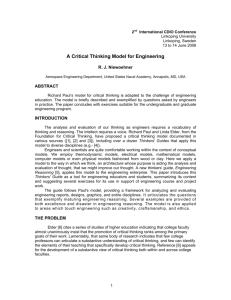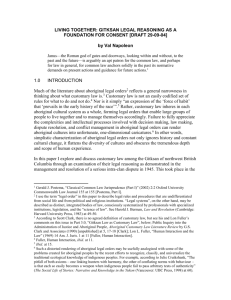Teaching Tips: An ORFD Bulletin
advertisement
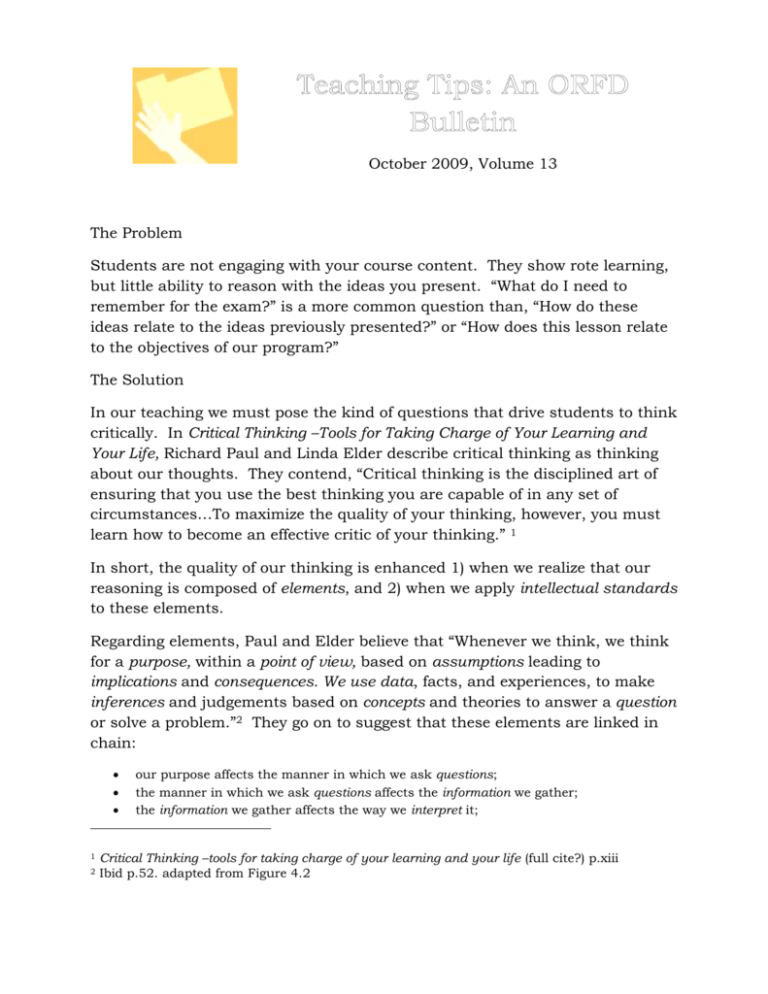
October 2009, Volume 13 The Problem Students are not engaging with your course content. They show rote learning, but little ability to reason with the ideas you present. “What do I need to remember for the exam?” is a more common question than, “How do these ideas relate to the ideas previously presented?” or “How does this lesson relate to the objectives of our program?” The Solution In our teaching we must pose the kind of questions that drive students to think critically. In Critical Thinking –Tools for Taking Charge of Your Learning and Your Life, Richard Paul and Linda Elder describe critical thinking as thinking about our thoughts. They contend, “Critical thinking is the disciplined art of ensuring that you use the best thinking you are capable of in any set of circumstances…To maximize the quality of your thinking, however, you must learn how to become an effective critic of your thinking.” 1 In short, the quality of our thinking is enhanced 1) when we realize that our reasoning is composed of elements, and 2) when we apply intellectual standards to these elements. Regarding elements, Paul and Elder believe that “Whenever we think, we think for a purpose, within a point of view, based on assumptions leading to implications and consequences. We use data, facts, and experiences, to make inferences and judgements based on concepts and theories to answer a question or solve a problem.”2 They go on to suggest that these elements are linked in chain: 1 2 our purpose affects the manner in which we ask questions; the manner in which we ask questions affects the information we gather; the information we gather affects the way we interpret it; Critical Thinking –tools for taking charge of your learning and your life (full cite?) p.xiii Ibid p.52. adapted from Figure 4.2 the way we interpret information affects the way we conceptualize it; the way we conceptualize information affects the assumptions we make; the assumptions we make affect the implications that follow from our thinking; the implications that follow from our thinking affect the way we see things, our point of view.3 By extension, you might get your students asking and answering these types of questions in conjunction with a particular assignment: What What What What What What What What is the fundamental purpose of the assignment? is the question you are trying to answer? information do you need to answer your question? is the most basic concept in that question? assumptions are you using in your reasoning? are your fundamental inferences or conclusions? are the implications of your reasoning (if you are correct)? is your point of view with respect to this issue?4 However, it is not enough to know the elements associated with reasoning. “Thinking critically requires a command of fundamental intellectual standards. Critical thinkers routinely ask questions that apply intellectual standards to thinking. The ultimate goal is for these questions to become so spontaneous in thinking that they form a natural part of our inner voice, guiding us to better and better reasoning.”5 To guide our students’ capacity to think critically, we also need to ask them the kinds of questions that apply intellectual standards to the reasoning process. Those standards, and questions they generate, might include: Clarity Logicalness Could you elaborate on your comment? Could you illustrate what you mean? Could you give an example? Does all of this make sense together? Does your first paragraph fit with your last? Does what you say follow from the evidence? Accuracy Significance How could we check on that? How could we find out if that is true? How could we verify or test that idea? Is this the most important problem to consider? Is this the central idea to focus on? Which of these facts are most important? Precision Breadth Could you be more specific? Could you give me more details? Could you be more exact? Do we need to look at this from another perspective? Do we need to consider another point of view? Do we need to look at this in others ways? Ibid p.59 Ibid p.54 adapted from Figure 4.4. 5 Paul, Richard and Elder, Linda Critical Thinking tools for taking charge of you learning and life (2001) Prentice Hall: Upper saddle River, New Jersey p.84 3 4 Depth Fairness What factors make this difficult problem? What are some of the complexities of this question? What are some of the difficulties we need to deal with? Is your thinking justifiable in context? Are your assumptions supported by evidence? Is your purpose fair, given the situation? Are you using your concepts in keeping with educated usage or are you distorting them to get what you want? Relevance How does that relate to the problem? How does that bear on the question? How does that help us with the issue? What stimulates student engagement? What drives our students’ reasoning to a new level? What causes our reasoning to be more precise and accurate? The answer to these questions is ‘questions’ - and particularly questions that apply intellectual standards. And, as Paul and Elder suggest, the more we employ these questions the more they become ingrained in the reasoning patterns of our audience. What questions do you ask your students to get them thinking critically? You might send yours to: Gordon Chutter (GordonC@twu.ca) or Bill Strom (strom@twu.ca) for future Teaching Tips.




